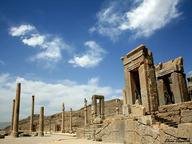Quiz Answer Key and Fun Facts
1. Herodotus begins his Histories with the once-great Lydian Empire, ruled by King Croesus, famous for his great riches.
One day, Croesus approaches the wise seer, Solon of Athens, asking whether he himself is in fact the happiest man in the world. How does Solon respond?
2. Croesus prepares to launch a campaign against the mighty Persian Empire. Before setting out, Croesus consults the Oracle at Delphi, asking whether such a campaign is wise. What does the Oracle say would happen if Croesus went to battle?
3. When Cyrus' Persians and Croesus' Lydians finally do battle, what is Cyrus' secret weapon?
4. Croesus is about to be burnt alive by Cyrus as a punishment for daring to cross the Persians. At this stage, he realises Solon's advice to be true: "count no man happy until his death."
However, he is saved from this horrible fate at the last minute. What saves him?
5. How did Cyrus eventually die?
6. One could say that Herodotus was also the father of travel writing. In Book 2 of his Histories, he pauses the narrative to tell us about his tour of Egypt. What particularly surprises him about Egyptian customs?
7. Cambyses, son of Cyrus, adds Egypt to the Persian Empire by defeating the great Pharaoh Amasis. However, Cambyses, according to Herodotus, goes mad shortly after and carries out a series of terrible crimes. Which of these is NOT one of Cambyses' crimes?
8. Cambyses, in his madness, secretly killed his brother. However it just so happened that there was a Magus who looked very similar to Cambyses' brother and who also happened to share the very same name! Upon the death of Cambyses, this Magus usurped the throne, pretending to be Cambyses' brother. What, according to Herodotus, was the name of this man?
9. There were seven conspirators, including Darius, who were not fooled by the fake Smerdis. They successfully managed to overthrow the fake Smerdis and claim the throne for themselves.
However, only one of the seven could be king. They decided to ride into the city and, out of the seven conspirators, award the throne to ...
10. The Ionian Greek states, situated along the Western coast of Turkey, decided to revolt against Darius and the Persians. Which mainland Greek state, also descended from the ancient Ionian tribe, sent troops to assist the revolt?
Source: Author
GPSpann
This quiz was reviewed by FunTrivia editor
bloomsby before going online.
Any errors found in FunTrivia content are routinely corrected through our feedback system.
